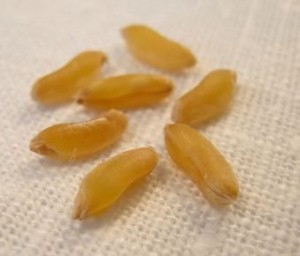Jamie Lockman, Regional Director – North America, with Kamut International, has been so kind as to provide me with info on KAMUT® Brand khorasan wheat. It saved me from doing a lot of research and we know everything is correct since this came from Jamie! Thanks!
The important thing for us non-technical folks to know is that KAMUT® is the trademarked name of khorasan wheat and as such, any time we see the name KAMUT®, we can rest assured that it is 100% organic and has been grown under the strict guidelines set forth by their company.
Without further ado, here’s the info from Jamie:
KAMUT® Brand khorasan is an organic, non-genetically modified, ancient wheat variety similar to durum. In 1990, “KAMUT” was registered as a trademark by the Quinn family in order to support organic farming and preserve the ancient khorsasan wheat variety. Under the KAMUT® Brand name, khorasan wheat must always be grown organically, never be hybridized or modified, and contain high levels of purity and nutrition. Today, Kamut International owns and has registered the KAMUT® trademark in over 40 countries, and is responsible for protection and marketing of all KAMUT® Brand khorasan wheat throughout the world.
KAMUT® wheat is grown on dryland certified organic farms primarily in Montana, Alberta, and Saskatchewan. The grain is prized by consumers who appreciate the grain for its high energy nutrition, easy digestibility, nutty/buttery taste, and firm texture. KAMUT® khorasan wheat is higher in protein, selenium, amino acids, and Vitamin E than most modern wheat and contains essential minerals such as magnesium and zinc. It is used as whole grain berries, whole grain flour, white flour, flakes, and puffs to make a variety of products. Some specific benefits of using KAMUT® khorasan are receiving more nutrients, protein, and taste than most commonly consumed whole wheat – plus supporting organic agriculture and helping to preserve an ancient grain.
KAMUT® khorasan is a variety of wheat thus has gluten content. A lot of people who are not able to tolerate wheat tell us that they are able to tolerate KAMUT® khorasan wheat. KI has ongoing research to understand why – it is our theory that because KAMUT® khorasan is an ancient grain, it retains the qualities that made it desirable so many years ago.
KAMUT® Brand khorasan wheat is used in many ways and in hundreds of products. It is sold as:
KAMUT® Brand khorasan wheat whole grain kernels
KAMUT® Brand khorasan wheat whole grain flour
KAMUT® Brand khorasan wheat white flour
KAMUT® Brand khorasan wheat flakes
KAMUT® Brand khorasan wheat rolled flakes
KAMUT® Brand khorasan wheat semi-pearled grain
KAMUT® Brand khorasan wheat bulgur
KAMUT® Brand khorasan wheat couscous
KAMUT® Brand khorasan puffed wheat
Sprouted KAMUT® Brand khorasan wheat whole grain kernels
Sprouted KAMUT® Brand khorasan wheat whole grain flour
KAMUT® Brand khorasan wheatgrass juice
KAMUT® Brand khorasan wheatgrass juice powder
Please visit the Kamut International website at www.kamut.com to learn more. And follow us on Facebook and Twitter to keep up with the latest news!



Theresa says
This is a great post– great information.
As to intolerance, there’s a lot of speculation of which mechanism causes the problems–glyphosate (Round Up) or the actual GM wheat, but it’s pretty clear that a lot of people can’t tolerate it. Most people who have problems from GM wheat seem to be able to eat ancient varieties of wheat.
I guess Round Up interferes with our gut bacteria the way it interferes with weeds, and that may be why so many people who used to be able to eat wheat are having tummy troubles, arthritis, etc. now.
Theresa says
I forgot to add– I”m one of those people. I stopped eating wheat so I could lose a few pounds– and it’s working, so far, 15 lbs– and my joints stopped aching after about a week of not eating wheat. I haven’t tried Kamut yet, but I’m going to.
JudyL says
This is a press release that may answer some of your questions about eating one wheat vs. another: http://www.kamut.com/en/press-release.html
Karen langseth says
Theresa, you should do some research, currently there is NO GM wheat or roundup wheat that is produced for resale in the USA. There are several countries in the world who are using GM wheat but none of those markets are in the US.
We do utilize wheat that is the result of hybridazation, which is combining two varieties of wheat to make a variety that has better qualities, but that process is way different then the creating a GM variety.
Theresa says
You’re right– I keep getting that confused with corn (which I also don’t eat, currently.) Corn is GM, nearly all of it, and wheat is that 1980’s hybrid. Sorry about that.
Karen langseth says
I guess corn is easily confused with wheat……and I suppose you don’t eat any soybeans or sugar products as they are also genetically modified.
And wheat isn’t necessariely a 1980’s thing…..my ancestors have been raising wheat since the -1870’s
Sharon in Michigan says
Judy, Thanks so much for the lesson on wheat! You always go out of your way for your followers.
Pat (EagleKnits) says
Very interesting post and article! I especially like that it has anti-inflammatory properties. If I can find some Kamut flour, I’ll use it to bake bread; even if I mix it with regular flour, it should boost the nutritional value.
Susan says
Our co-op (TN and AL, maybe more places) sells Kamut regularly, but I think only the grain. I never noticed if they had flour or other versions you listed.